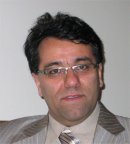|
Plenary Lecture
Towards Opposition and Center-Based Sampling for High-Dimensional Search
Spaces

Assistant Professor Shahryar Rahnamayan
University of Ontario Institute of Technology (UOIT)
Faculty of Engineering and Applied Science, Oshawa, CANADA
E-mail: Shahryar.Rahnamayan@uoit.ca
Abstract: EFootprints of the opposition concept can be observed in many
areas around us. But it has sometimes been called by different names. Opposite
particles in physics, complement of an event in probability, absolute or
relative complement in set theory, and theses and antitheses in dialectic just
are some examples to mention. Recently for the first time, Opposition-Based
Learning (OBL) was proposed and then the opposition-based methods have been
introduced in different artificial intelligence areas. All of them have tried
to enhance searching or leaning process by utilizing the opposition concept.
Opposition-based evolutionary algorithms, opposition-based neural networks,
and also opposition-based reinforcement learning are some efforts in this
direction. The main idea behind OBL is the simultaneous consideration of a
candidate and its corresponding opposite candidate in order to achieve a
better approximation for the current solution. The first and second parts of
this lecture introduce the opposition-based sampling and its applications in
various soft computing techniques and center-based sampling, respectively.
Population-based algorithms, such as Differential Evolution (DE), Particle
Swarm Optimization (PSO), Genetic Algorithms (GAs), and Evolutionary
Strategies (ES) are commonly used approaches to solve complex problems from
science and engineering. They work with a population of candidate solutions.
In this lecture, a novel center-based sampling is introduced for these
algorithms. Reducing the number of function evaluations to tackle with
high-dimensional problems is a worthwhile attempt; the proposed center-based
sampling can open a new research area in this direction. Our simulation
results confirm that this kind of sampling, which can be utilized during
population initialization and/or generating successive generations, can be
valuable in solving high-dimensional problems efficiently. Quasi-Oppositional
Differential Evolution (QODE) will briefly be discussed as an evidence to
support the proposed sampling theory. Finally, the opposition-based sampling
and center-based sampling will be compared in this lecture.
Brief Biography of the Speaker:
Dr. Shahryar received his B.Sc. and M.Sc. degrees both with honors in software
engineering from Shahid Beheshti University, Iran. He is holding a PhD degree
in evolutionary computation from University of Waterloo, Canada.
Opposition-based differential evolution (ODE) was proposed in his PhD thesis.
He was a chief research manager at OMISA Inc. (Omni-Modality Intelligent
Segmentation Assistant); a company which develops innovative software for
medical image segmentation. Before joining to faculty of engineering and
applied science at UOIT, Canada, as a tenure-track faculty member, he was a
postdoctoral fellow at Simon Fraser University (SFU), Canada. His research
includes evolutionary computation and image processing. Dr. Shahryar was
awarded the Ontario Graduate Scholarship (OGS), Presidentís Graduate
Scholarship (PGS), NSERCís Japan Society for the Promotion of Science (JSPS)
Fellowship, NSERCís Industrial R&D Fellowship (IRDF), NSERCís Visiting
Fellowship in Canadian Government Laboratories (VF), and the Canadian
Institute of Health Research (CIHR) Fellowship for two times. He was a CIHR
research fellow for two years at Medial Imaging Department at Robarts Research
Institute, Canada. During the PhD program, he published six journal papers,
three book chapters, and 17 conference papers. Furthermore, one of his PhD
works is a part of a patent which was registered by University of Waterloo.
|